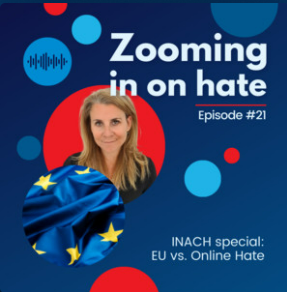INACH joined EOOH into making a podcast!
In this episode of “Zooming In on Hate,” we are joined by Louisa Klingvall from the European Commission, which was recorded live during our INACH’s Annual Conference. The dialogue provides a nuanced exploration of the European Union’s role in combatting the complex issue of online hate.
Louisa Klingvall has worked in the Fundamental Rights Unit of the European Commission DG Justice since 2012. Her main focus of work comprises fundamental rights aspects in the Commission’s Digital Single Market files. In this capacity she has been closely involved in the Commissions work on illegal content, disinformation, the Digital ServiceS Act and the Artificial Intelligence Act. She is a team leader charged with ensuring the overall coordination of the anti-racism team and consistency of legal and policy outputs and of the team managing the Code of Conduct on Illegal Hate Speech Online. It is important to note that her views in this epidode are shared in a personal capacity, not as a representative of the European Commission.
The conversation delves into the multifaceted nature of online hate, debunking the notion that it is an impossible concept to define. Louisa categorises it into two main types: hate speech reaching criminal law benchmarks and non-criminal forms of hate speech or stereotyping. The distinction lies in the response mechanism, with criminal forms requiring removal and prosecution, while non-criminal forms necessitate counter speech and civic engagement.
Tech companies play a crucial role in combatting online hate, with a significant focus on collaboration between platforms and civil society. Louisa highlights the success of the Code of Conduct in shaping content moderation practices. This collaborative approach has influenced the Digital Services Act (DSA), reflecting a broader societal engagement model.
The interview touches upon the influence of cultural and political contexts on the prevalence of online hate. Louisa acknowledges that manifestations are coloured by history, traditions, and political landscapes, emphasising the need for more research to understand the impact of these factors on counter policies. Louisa also commends the relentless work of civil society in protecting victims and promoting tolerance. She sees promise in the intersection of technology with sociology, psychology, and mental health, as tech companies explore evidence-based models for effective counter-narratives. Looking toward the future, Louisa expresses optimism about the DSA, citing its potential to strike a balance in shaping an online environment through broad societal consensus. The DSA recognises that top-down solutions are insufficient and emphasises the importance of societal engagement in addressing issues like hate speech and disinformation.
This episode provides a thought-provoking glimpse into ongoing efforts to combat online hate, showcasing the evolving strategies and collaborative approaches at the forefront of this critical battle.
